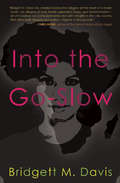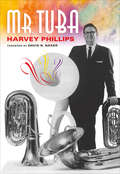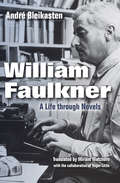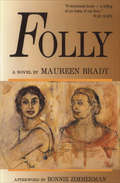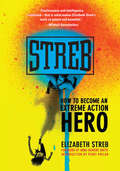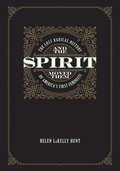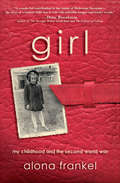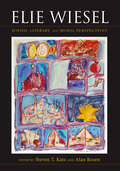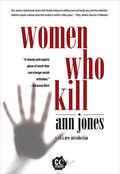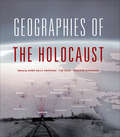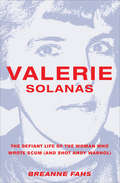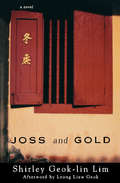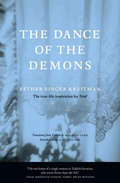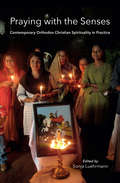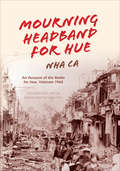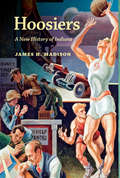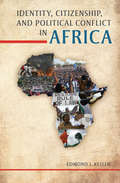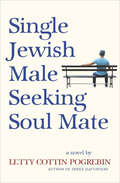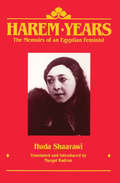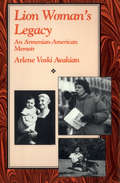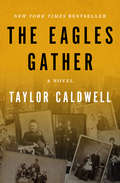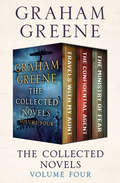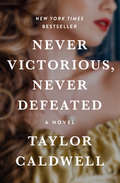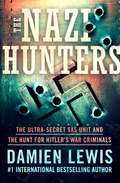- Table View
- List View
Into the Go-Slow
by Bridgett M. DavisA young black woman visits Africa on a quest for peace, meaning, and love in &“a beautiful allegory at the heart of a realist novel . . . A strong book&” (Chris Abani, author of The Secret History of Las Vegas). In 1986 Detroit, twenty-one-year-old Angie is still mourning the death of her brilliant, radical sister, Ella, when she impulsively decides to pack up and go to the place where Ella tragically died four years before: Nigeria. There, Angie retraces her sister&’s steps, all the while navigating the chaotic landscape of a major African country on the brink of democracy and careening toward a coup d&’état. At the center of her quest is a love affair that upends everything Angie thought she knew about herself. Against a backdrop of Nigeria&’s infamous &“go-slow&”—traffic as wild and unpredictable as the country itself—Angie begins to unravel the mysteries of the past, and opens herself up to love and life after Ella.
Mr. Tuba
by Harvey PhillipsThe autobiography of &“possibly the greatest tuba player of all time&” (New York Times), the man who &“put class in the low brass.&” (Clark Terry, jazz trumpeter) With warmth and humor, tuba virtuoso Harvey Phillips tells the story of his amazing life and career—from his Missouri childhood through his days as a performer with the King Brothers and the Ringling Bros. and Barnum & Bailey circuses, his training at the Juilliard School, a stint with the U.S. Army Field Band, and his freelance days with the New York City Opera and Ballet. A founder of the New York Brass Quintet, Phillips served as vice president of the New England Conservatory of Music and became Distinguished Professor of Music at Indiana University. The creator of an industry of TubaChristmases, Octubafests, and TubaSantas, he crusaded for recognition of the tuba as a serious musical instrument, commissioning more than 200 works. Enhanced by an extensive gallery of photographs, Mr. Tuba conveys Phillips&’s playful zest for life while documenting his important musical legacy. &“Mr. Tuba is not only a memoir, but it is a history of the twentieth century American music world and a resource for all music teachers and music lovers.&” —NBA Journal &“A lively and informative read.&” —Herald-Times &“[Phillips&’s] autobiography is a fitting end to his life&’s works, underlined with the same sense of inspiration and integrity that informed all of his musical activities.&” —Bloom Magazine
William Faulkner: A Life through Novels
by André Bleikasten&“Accessible . . . Engaging . . . May well be our fullest account to date of what Bleikasten calls Faulkner&’s &‘energy for life&’ and &‘will to write.&’&” —Theresa Towner, author of The Cambridge Introduction to William Faulkner Writing to American poet Malcolm Cowley in 1949, William Faulkner expressed his wish to be known only through his books—but his wish would not come true. He would go on to win the Nobel Prize for literature several months later, and when he died famous in 1962, his biographers immediately began to unveil and dissect the unhappy life of &“the little man from Mississippi.&” Despite the many works published about Faulkner, his life and career, it still remains a mystery how a poet of minor symbolist poems rooted in the history of the Deep South became one of the greatest novelists of the twentieth century. Here, renowned critic André Bleikasten revisits Faulkner&’s biography through the author&’s literary imagination. Weaving together correspondence and archival research with the graceful literary analysis for which he is known, Bleikasten presents a multi-strand account of Faulkner&’s life in writing. By carefully keeping both the biographical and imaginative lives in hand, Bleikasten teases out threads that carry the reader through the major events in Faulkner&’s life, emphasizing those circumstances that mattered most to his writing: the weight of his multi-generational family history in the South; the formation of his oppositional temperament provoked by a resistance to Southern bourgeois propriety; his creative and sexual restlessness and uncertainty; his lifelong struggle with finances and alcohol; his paradoxical escape to the bondages of Hollywood; and his final bent toward self-destruction. This is the story of the man who wrote timeless works and lived in and through his novels.
Folly: A Novel
by Maureen BradyA modern classic of race, labor rights, and lesbian love written &“with an authenticity, a force, a caring that deepens and enlarges us" (Tillie Olsen, author of Tell Me A Riddle). Brought together by the tragic death of an infant, black and white women at a North Carolina textile factory join together to strike against the plant&’s unfeeling management. A story of race relations and the power of grassroots organizing, this absorbing novel becomes a love story when two very different women in the group fall for each other. Speaking first to the value of labor and the realities of homophobia and racism, this story also celebrates the transformative power of love in the lives of maginalized women. Library Journal praised Folly for the &“depth and reality of its characters.&” And as the Washington Blade said, &“this book effectively reminds readers that, although we have made many gains, we have a long way to go.&”
Streb: How to Become an Extreme Action Hero
by Elizabeth StrebAn inspiring memoir and self-help guide to greatness by the dancer Mikhail Baryshnikov calls &“fearlessness and intelligence combined . . . potent and beautiful.&” Called &“the Evel Knievel of Dance,&” Elizabeth Streb has been pushing boundaries and testing the potential of the human body since childhood. Can she fly? Can she run up walls? Can she break through glass? How fast can she go? With clarity and humor—and with her internationally-renowned dance troupe STREB—she continues to investigate what movement truly is and has come to these conclusions: It&’s off the ground! It creates impact! And it hurts trying to stop! Here, Streb combines memoir and analysis to convey how she became an extreme action dancer and choreographer, developing a form of movement that&’s more NASCAR than modern dance, more boxing than ballet, and more than most people can handle &“in this dizzying, inspirational self-help&” books (Publishers Weekly, starred review).
And the Spirit Moved Them: The Lost Radical History of America's First Feminists
by Helen LaKelly HuntThe New York Times–bestselling author of Getting the Love You Want sends out a &‘call for renewed feminist action, based on &“the spirit and ethic of love&’&” (Kirkus Reviews). A decade before the Seneca Falls Convention, black and white women joined together at the 1837 Anti-Slavery Convention of American Women in the first instance of political organizing by American women for American women. Incited by &“holy indignation,&” these pioneers believed it was their God-given duty to challenge both slavery and patriarchy. Although the convention was largely written out of history for its religious and interracial character, these women created a blueprint for an intersectional feminism that was centuries ahead of its time. Part historical investigation, part personal memoir, Hunt traces how her research into nineteenth-century organizing led her to become one of the most significant philanthropists in modern history. Her journey to confront her position of power meant taking control of an oil fortune that was being deployed on her behalf but without her knowledge, and acknowledging the feminist faith animating her life&’s work.
Girl: My Childhood and the Second World War
by Alona Frankel&“An impressionistic memoir of a Polish Jewish girl&’s survival hiding as a Gentile in Nazi-occupied Poland . . . truly moving and bravely rendered.&” —Kirkus Reviews, starred review Alona Frankel was just two years old when Germany invaded Poland. After a Polish carpenter agreed to hide her parents but not her, Alona&’s parents desperately handed her over to a greedy woman who agreed to hide her only as long as they continued to send money. Isolated from her parents and living among pigs, horses, mice, and lice, Alona taught herself to read and drew on scraps of paper. The woman would send these drawings to Alona&’s parents as proof that Alona was still alive. In time, the money ran out and Alona was tossed into her parents&’ hiding place, at this point barely recognizing them. After Poland&’s liberation, Alona&’s mother was admitted to a terminal hospital and Alona handed over to a wealthy, arrogant family of Jewish survivors who eventually cast her off to an orphanage. Despite these daily horrors and dangers surrounding her, Alona&’s imagination could not be restrained. Faithful to the perspective of the heroine herself, Frankel, now a world-renowned children&’s author and illustrator, reveals a little girl full of life in a terrible, evil world. &“A wonderful contribution to the canon of Holocaust literature—the story of a hidden child that is told with indelible images and tender words.&” —Thane Rosenbaum, author of How Sweet It Is!
Elie Wiesel: Jewish, Literary, and Moral Perspectives (Jewish Literature And Culture Ser.)
by Steven T. Katz and Alan Rosen&“Illuminating . . . 24 academic essays covering Wiesel&’s interpretations of the Bible, retellings of Talmudic stories . . . his post-Holocaust theology, and more.&” —Publishers Weekly Nobel Peace Prize recipient Elie Wiesel, best known for his writings on the Holocaust, is also the accomplished author of novels, essays, tales, and plays as well as portraits of seminal figures in Jewish life and experience. In this volume, leading scholars in the fields of Biblical, Rabbinic, Hasidic, Holocaust, and literary studies offer fascinating and innovative analyses of Wiesel&’s texts as well as enlightening commentaries on his considerable influence as a teacher and as a moral voice for human rights. By exploring the varied aspects of Wiesel&’s multifaceted career—his texts on the Bible, the Talmud, and Hasidism as well as his literary works, his teaching, and his testimony—this thought-provoking volume adds depth to our understanding of the impact of this important man of letters and towering international figure. &“This book reveals Elie Wiesel&’s towering intellectual capacity, his deeply held spiritual belief system, and the depth of his emotional makeup.&” —New York Journal of Books &“Close, scholarly readings of a master storyteller&’s fiction, memoirs and essays suggest his uncommon breadth and depth . . . Criticism that enhances the appreciation of readers well-versed in the author&’s work.&” —Kirkus Reviews &“Navigating deftly among Wiesel&’s varied scholarly and literary works, the authors view his writings from religious, social, political, and literary perspectives in highly accessible prose that will well serve a broad and diverse readership.&” —S. Lillian Kremer author of Women&’s Holocaust Writing: Memory and Imagination
Women Who Kill: With Previously Unpublished Material On The "battered Women's Syndrome"
by Ann JonesThis landmark study offers a rogues&’ gallery of women—from the Colonial Era to the 20th century—who answered abuse and oppression with murder: &“A classic&” (Gloria Steinem). Women rarely resort to murder. But when they do, they are likely to kill their intimates: husbands, lovers, or children. In Women Who Kill, journalist Ann Jones explores these homicidal patters and what they reflect about women and our culture. She considers notorious cases such as axe-murderer Lizzie Borden, acquitted of killing her parents; Belle Gunness, the Indiana housewife turned serial killer; Ruth Snyder, the &“adulteress&” electrocuted for murdering her husband; and Jean Harris, convicted of shooting her lover, the famous &“Scarsdale Diet doctor.&” Looking beyond sensationalized figures, Jones uncovers different trends of female criminality through American history—trends that reveal the evolving forms of oppression and abuse in our culture. From the prevalence of infanticide in colonial days to the poisoning of husbands in the nineteenth century and the battered wives who fight back today, Jones recounts the tales of dozens of women whose stories, and reasons, would otherwise be lost to history. First published in 1980, Women Who Kill is a &“provocative book&” that &“reminds us again that women are entitled to their rage.&” This 30th anniversary edition from Feminist Press includes a new introduction by the author (New York Times Book Review).
Geographies of the Holocaust (The\spatial Humanities Ser.)
by Anne Kelly Knowles Tim Cole Alberto Giordano&“[A] pioneering work . . . Shed[s] light on the historic events surrounding the Holocaust from place, space, and environment-oriented perspectives.&” —Rudi Hartmann, PhD, Geography and Environmental Sciences, University of Colorado This book explores the geographies of the Holocaust at every scale of human experience, from the European continent to the experiences of individual human bodies. Built on six innovative case studies, it brings together historians and geographers to interrogate the places and spaces of the genocide. The cases encompass the landscapes of particular places (the killing zones in the East, deportations from sites in Italy, the camps of Auschwitz, the ghettos of Budapest) and the intimate spaces of bodies on evacuation marches. Geographies of the Holocaust puts forward models and a research agenda for different ways of visualizing and thinking about the Holocaust by examining the spaces and places where it was enacted and experienced. &“An excellent collection of scholarship and a model of interdisciplinary collaboration . . . The volume makes a timely contribution to the ongoing emergence of the spatial humanities and will undoubtedly advance scholarly and popular understandings of the Holocaust.&” —H-HistGeog &“An important work . . . and could be required reading in any number of courses on political geography, GIS, critical theory, biopolitics, genocide, and so forth.&” —Journal of Historical Geography &“Both students and researchers will find this work to be immensely informative and innovative . . . Essential.&” —Choice
Valerie Solanas: The Defiant Life of the Woman Who Wrote Scum (and Shot Andy Warhol)
by Breanne FahsThe authoritative biography of the 60s countercultural icon who wrote SCUM Manifesto, shot Andy Warhol, and made an unforgettable mark on feminist history. Valerie Solanas is one of the most polarizing figures of 1960s counterculture. A cult hero to some and vehemently denounced by others, she has been dismissed but never forgotten. Known for shooting Andy Warhol in 1968 and for writing the infamous SCUM Manifesto, Solanas became one of the most famous women of her era. But she was also diagnosed with paranoid schizophrenia and spent much of her life homeless or in mental hospitals. Solanas&’s SCUM Manifesto, a sui generis vision of radical gender dystopia, predicted ATMs, test-tube babies, the Internet, and artificial insemination long before they existed. It has sold more copies and been translated into more languages than nearly all other feminist texts of its time. And yet, shockingly little work has investigated the life of its author. This book is the first biography about Solanas, including original interviews with family, friends (and enemies), and numerous living Warhol associates. It reveals surprising details about Solanas&’s life: the children nearly no one knew she had, her drive for control over her own writing, and her elusive personal and professional relationships. Valerie Solanas reveals the tragic, remarkable life of an iconic figure. It is &“not only a remarkable biographical feat but also a delicate navigation of an unwieldy, demanding, and complex life story&” (BOMB Magazine).
Joss and Gold: A Novel
by Shirley Geok-lin LimA piercing tale of a Malaysian woman&’s quest for independence that combines &“the nuance of a poet with the ear of a born storyteller&” (Julia Watson, coeditor of Women, Autobiography, Theory: A Reader). Li An, a young Malaysian woman of Chinese descent, seeks to understand herself as the country around her struggles to determine its own identity. And much like the politically charged atmosphere of 1969 Kuala Lumpur, Li An must confront the contradictions within. While she supports her nation&’s fight to break free from the influence of British colonial rule, she cannot deny her love for the English poetry that she teaches. While she aspires to be an independent woman, she still finds herself married to the dependable Henry—until she meets an American Peace Corps volunteer named Chester Brookfield. Their encounter propels Li An on a quest of self-discovery, one that spans the divide between East and West, women and men, freedom and responsibility. Told with insight and wit, Lim&’s sweeping debut novel demonstrates that while the journey is never easy, all roads lead, ultimately, to our true selves. &“This elegantly crafted tale places Lim among the most imaginative and dexterous storytellers writing in the English language today.&” —Rey Chow, author of Primitive Passions &“A gripping novel centered around a strong, language-struck, culture-crossing Asian woman&’s quest for independence.&” —Rob Wilson, author of Reimagining the American Pacific &“This felicitous novel is several books in one—Madame Butterfly transplanted to Malaysia, a feminist manifesto, and a commentary on the new Southeast Asia that has been emerging in recent years. Lim has woven these strands together in a colorful batik that is dazzling.&” —Hisaye Yamamoto, author of Seventeen Syllables and Other Stories
The Dance of the Demons: A Novel (The\helen Rose Scheuer Jewish Women's Ser.)
by Esther Singer KreitmanA semi-autobiographical portrait of the original Yentl and &“an important contribution to the vastly neglected genre of feminist Yiddish literature&” (Booklist). In this autobiographical novel—originally published in Yiddish as Der Sheydim Tanz in 1936—Esther Kreitman lovingly depicts a world replete with rabbis, yeshiva students, beggars, farmers, gangsters, seamstresses, and socialists as seen through the eyes of the girl who served as Isaac Bashevis Singer&’s inspiration for the story &“Yentl, the Yeshiva Boy.&” Barred from the studies at which her idealistic rabbi father and precocious brother excel, Deborah revels in the books she hides behind the kitchen stove, her brief forays outside the household, and her clandestine attraction to a young Warsaw rebel. But her family confines and blunts her dreams, as they navigate the constraints of Jewish life in a world that tolerates, but does not approve, their presence. Forced into an arranged marriage, Deborah runs away on the eve of World War into a world that would offer more than she ever dreamed . . . This edition includes memorial pieces by Kreitman&’s son and granddaughter.
Praying with the Senses: Contemporary Orthodox Christian Spirituality in Practice (Encounters: Explorations in Folklore and Ethnomusicology)
by Tom Boylston Angie Heo Jeffers Engelhardt Vlad Naumescu Jeanne Kormina Daria Dubovka Simion Pop&“These essays advance the understanding of Eastern Orthodox spiritual practices from a religious studies perspective.&”—Reading Religion How do people experience spirituality through what they see, hear, touch, and smell? In this book, Sonja Luehrmann and an international group of scholars assess how sensory experience shapes prayer and ritual practice among Eastern Orthodox Christians. Prayer, even when performed privately, is considered as a shared experience and act that links individuals and personal beliefs with a broader, institutional, or imagined faith community. It engages with material, visual, and aural culture including icons, relics, candles, pilgrimage, bells, and architectural spaces. Whether touching upon the use of icons in the age of digital and electronic media, the impact of Facebook on prayer in Ethiopia, or the implications of praying using recordings, amplifiers, and loudspeakers, these timely essays present a sophisticated overview of the history of Eastern Orthodox Christianities. Taken as a whole they reveal prayer as a dynamic phenomenon in the devotional and ritual lives of Eastern Orthodox believers across Eastern Europe, the Middle East, North Africa, and South Asia. &“Precisely by looking at so varied a group of locations home to Orthodox practice, this book conveys the fragility―and durability―of traditional religion in a postmodern, secular age.&”—Nadieszda Kizenko, author of A Prodigal Saint: Father John of Kronstadt and the Russian People
Mourning Headband for Hue: An Account of the Battle for Hue, Vietnam 1968
by Nha Ca&“An intimate―and disturbing―account of war at its most brutal, told from the point of view of civilians trying to survive the maelstrom.&” —Publishers Weekly Vietnam, January, 1968. As the citizens of Hue are preparing to celebrate Tet, the start of the Lunar New Year, Nha Ca arrives in the city to attend her father&’s funeral. Without warning, war erupts all around them, drastically changing or cutting short their lives. After a month of fighting, their beautiful city lies in ruins and thousands of people are dead. Mourning Headband for Hue tells the story of what happened during the fierce North Vietnamese offensive and is an unvarnished and riveting account of war as experienced by ordinary people caught up in the violence. &“A visceral reminder of war&’s intimate slaughter.&” —Kirkus Reviews &“[A] searing eyewitness account . . . It makes for an intimate―and disturbing―account of war at its most brutal told from the point of view of civilians trying to survive the maelstrom.&” —VVA Veteran
Hoosiers: A New History of Indiana
by James H. MadisonThe story of this Midwestern state and its people, past and present: &“An entertaining and fast read.&” ―Indianapolis Star Who are the people called Hoosiers? What are their stories? Two centuries ago, on the Indiana frontier, they were settlers who created a way of life they passed to later generations. They came to value individual freedom and distrusted government, even as they demanded that government remove Indians, sell them land, and bring democracy. Down to the present, Hoosiers have remained wary of government power and have taken care to guard their tax dollars and their personal independence. Yet the people of Indiana have always accommodated change, exchanging log cabins and spinning wheels for railroads, cities, and factories in the nineteenth century, automobiles, suburbs, and foreign investment in the twentieth. The present has brought new issues and challenges, as Indiana&’s citizens respond to a rapidly changing world. James H. Madison&’s sparkling new history tells the stories of these Hoosiers, offering an invigorating view of one of America&’s distinctive states and the long and fascinating journey of its people.
Identity, Citizenship, and Political Conflict in Africa (Encounters: Explorations in Folklore and Ethnomusicology)
by Edmond J. Keller&“Engaging…detailed with current information about the situation in many African countries.&” —African Studies Quarterly Reflecting on the processes of nation-building and citizenship formation in Africa, Edmond J. Keller believes that although some deep parochial identities have eroded, they have not disappeared—and may be more assertive than previously thought, especially in instances of political conflict. Keller reconsiders how national identity has been understood in Africa and presents new approaches to identity politics, intergroup relations, state-society relations, and notions of national citizenship and citizenship rights. Focusing on Nigeria, Ethiopia, Cote d'Ivoire, Kenya, and Rwanda, he lays the foundation for a new understanding of political transition in contemporary Africa. &“This book would certainly be useful in graduate seminars on African politics, African history or ethnic politics. It is written in a clear, straightforward style that also makes it appropriate for use in advanced undergraduate classes. Keller also offers insights for policymakers and development practitioners who continue to grapple with the real-world consequences of citizenship conflicts.&”—Journal of Modern African Studies
Single Jewish Male Seeking Soul Mate: A Novel
by Letty Cottin PogrebinThis novel &“unflinchingly confronts the issue of Jewish continuity in a diverse and changing America&” (Anne Roiphe, author and journalist). Feminist icon Letty Cottin Pogrebin&’s second novel is the story of Zach Levy, the left-leaning son of Holocaust survivors who promises his mother on her deathbed that he will marry within the tribe and raise Jewish children. When he falls for Cleo Scott, an African American activist grappling with her own inherited trauma, he must reconcile his old vow to the family he loves with the present reality of the woman who may be his soul mate. A New York love story complicated by the legacies and modern tensions of Jewish American and African American history, Single Jewish Male Seeking Soul Mate explores what happens when the heart runs counter to politics, history, and the compelling weight of tradition. &“A beautifully written and heartwarming masterpiece.&” —Menachem Z. Rosensaft, founding chair of the International Network of Children of Jewish Holocaust Survivors &“Cleareyed, courageous.&” —Kirkus Reviews
Harem Years: The Memoirs of an Egyptian Feminist
by Huda ShaarawiA firsthand account of the private world of a harem in colonial Cairo—by a groundbreaking Egyptian feminist who helped liberate countless women. In this compelling memoir, Shaarawi recalls her childhood and early adult life in the seclusion of an upper-class Egyptian household, including her marriage at age thirteen. Her subsequent separation from her husband gave her time for an extended formal education, as well as an unexpected taste of independence. Shaarawi&’s feminist activism grew, along with her involvement in Egypt&’s nationalist struggle, culminating in 1923 when she publicly removed her veil in a Cairo railroad station, a daring act of defiance. In this fascinating account of a true original feminist, readers are offered a glimpse into a world rarely seen by westerners, and insight into a woman who would not be kept as property or a second-class citizen.
Lion Woman's Legacy: An Armenian-American Memoir (The\cross-cultural Memoir Ser.)
by Arlene Voski AvakianA &“vivid and engrossing&” narrative of one woman&’s journey from shame and internal conflict to becoming a liberated, confident, and proud lesbian (Kirkus Reviews). The descendant of survivors of the Armenian genocide, Arlene Avakian was raised in America where she could live free. But even with that freedom, she found herself a prisoner of both her family and society, denying her heritage along with her true sexuality. After marriage and motherhood, Arlene found herself exploring the growing women&’s lib movement of the 1970s, coming to embrace the strength of her grandmother—known as the Lion Woman—and realizing her full potential and personhood. Inspired by her passionate feminism and strengthened by a loving lesbian relationship, Avakian recollects and re-examines her personal history and the story of her courageous grandmother, revealing a legacy of radical politics, fierce independence, and a powerful affirmation of ethnic identity in this &“extremely readable and often painfully honest book&” (Library Journal).
The Eagles Gather: A Novel (The Barbours and Bouchards Series #2)
by Taylor CaldwellNew York Times Bestseller: In the &“undeniably powerful&” sequel to Dynasty of Death, a new generation of Bouchards battles over the family empire (The New York Times Book Review). In the decade after World War I, Jules Bouchard prepares to leave controlling interest in his global munitions enterprise to his son Armand. But the inheritance comes with a warning: Armand&’s ruthless brothers, Emile and Christopher, will be gunning for him. It&’s not long before Christopher commits financial treachery in an effort to unseat his brother. Worse, he hatches a plot involving his sister, Celeste, whose innocence he had vowed to always protect. While Christopher&’s machinations and Armand&’s countermoves threaten to tear the family apart, hope emerges from a distant relative who seems to possess the noble character of his ancestors. But are his intentions as honorable as they seem?
The Collected Novels Volume Two: The Missing Person, The Magician's Girl, and The Book of Knowledge
by Doris GrumbachThree brilliant works of fiction from a feminist and lesbian literary icon who was &“acutely sensitive to the quiet hum of everyday living&” (Ms.).The Missing Person: Legendary movie star Franny Fuller captured the imaginations of audiences, men, and her biographer, Mary Maguire. But what does the glamour hide? This is the story of how a girl from Utica, New York, transformed into a Hollywood sensation—and the secret she had to keep if she wanted to hold onto her fairytale life . . . The Magician&’s Girl: Minna Grant, Maud Noon, and Liz Becker met as roommates at Barnard College. After graduation, each woman pursues her own dreams, living out her own passions, tragedies, and destiny—all while maintaining their enduring friendship acros s decades. Grumbach tells a courageous, nuanced, and &“engrossing&” tale of female friendship, coming of age, and an ever-changing New York (Publishers Weekly). The Book of Knowledge: In the summer of 1929, four children forge a bond that will change their lives. Caleb and Kate Flowers live an isolated existence until Lionel Schwartz and Roslyn Hellman arrive in Far Rockaway. Over the years, their friendship brings profound realizations and undeniable passions for all four in this &“grimly compelling,&” truthful, and tragic tale of self-discovery (Booklist).
The Collected Novels Volume Four: Travels with My Aunt, The Confidential Agent, and The Ministry of Fear
by Graham GreeneFrom exuberant comedy to edge-of-your-seat intrigue, a trio of novels from &“a superb storyteller&” (The New York Times). These three novels—ranging from a journey of transformation with a larger-than-life aunt to dark tales of international intrigue—beautifully illustrate the myriad ways in which the acclaimed British author &“had wit and grace and character and story and a transcendent universal compassion that places him for all time in the ranks of world literature&” (John le Carré). Travels with my Aunt: Now that dullish London bank manager Henry Pulling has retired with an agreeable pension, he plans to spend more time weeding his dahlias. Then, for the first time in fifty years, he sees his aunt Augusta at his mother&’s funeral. Charging into her seventies with florid abandon, Augusta insists that Henry abandon his garden, follow her, and hold on tight. She whisks her nephew out of Brighton and onto the Orient Express bound for Paris and Istanbul, then on to Paraguay, and down the rabbit hole of her past, which swarms with swindlers, smugglers, war criminals, and rather unconventional lovers. With each new stop, Henry discovers not only more about his aunt and her secrets but also about himself. &“Cheerfully irreverent.&” —The Guardian The Confidential Agent: In prewar England, D., a professor of Romance literature, has arrived in Dover on an important mission to buy coal for his country, one torn by civil war. With it, there&’s a chance to defeat fascist influences. Without it, the loyalists will fail. When D. strikes up a romance with the estranged but solicitous daughter of a powerful coal-mining magnate, everything appears to be in his favor—if not for a counteragent who has come to England with the intent of sabotaging every move he makes. Accused of forgery and theft, and roped into a charge of murder, D. becomes a hunted man, hemmed in at every turn by an ever-tightening net of intrigue and double cross. &“[A] magnificent tour-de-force among tales of international intrigue.&” —The New York Times The Ministry of Fear: On a peaceful Sunday afternoon, Arthur Rowe comes upon a charity fete where he wins a game of chance. If only this were an ordinary day. Britain is under threat by Germany, and the air raid sirens that bring the bazaar to a halt expose Rowe as no ordinary man. Recently released from a psychiatric prison for the mercy killing of his wife, he is burdened by guilt, and now, in possession of a seemingly innocuous prize, on the run from Nazi spies who want him dead. Pursued on a dark odyssey through the bombed-out streets of London, there isn&’t a soul he can trust, not even himself. Because amnesiac Arthur Rowe doesn&’t even know who he really is. &“[A] master thriller.&” —Time
Never Victorious, Never Defeated: A Novel
by Taylor CaldwellNew York Times Bestseller: A sprawling epic of an American railroad dynasty&’s &“sensational intrigues and stormy struggles for power&” (The New York Times Book Review). Founded in Portersville, Pennsylvania, in the latter days of Andrew Jackson&’s presidency, the Interstate is a small regional railroad with vast potential. Also, it is the birthright of Aaron deWitt&’s sons: ruthless yet charming Rufus and stubborn, idealistic Stephen. When Stephen wins control of the Interstate, his victory starts a series of events that will roil the deWitt family for generations. Over decades, the Interstate grows into an enterprise capable of shaping the future of the nation. Yet, both its triumphs and defeats sow the seeds of the deWitt family&’s downfall. Brothers plot against brothers, sons demean fathers, wives betray husbands—all in pursuit of monumental power. Not even Cornelia, Rufus&’s beautiful and cunning daughter, can ensure that the deWitt family name won&’t disappear. Spanning nearly a century, Never Victorious, Never Defeated is a brilliant dramatization of the lives of America&’s robber barons and further proof that Taylor Caldwell &“never falters when it comes to storytelling&” (Publishers Weekly).
The Nazi Hunters: The Ultra-Secret SAS Unit and the Hunt for Hitler's War Criminals
by Damien LewisThe gripping &“untold story&” of the Secret Hunters, deep-cover British special forces who pursued Nazi fugitives from justice after World War II (Daily Mail). In the late summer of 1944, eighty British Special Air Service (SAS) soldiers undertook a covert commando raid, parachuting behind enemy lines into the Vosges Mountains in occupied France to sabotage Nazi-held roads, railways, and ammo dumps, and assassinate high-ranking German officers, undermining the final stand of Hitler&’s Third Reich. Despite their successes, more than half the men were captured, tortured, and executed. Although the SAS was officially dissolved when the war ended, a top-secret black ops unit was formed, under Churchill&’s personal command, to hunt down the SS commanders who had murdered their special forces comrades, as well as war criminals from concentration camps who had eluded the Nuremberg trials. Under the cover of full deniability, &“The Secret Hunters&” waged a covert war of justice and retribution—uncovering the full horror of Hitler&’s regime as well as dark secrets of Stalin&’s Russia and the growing threat of what would become the Cold War. Finally revealing the fascinating details of the secret postwar mission that became a central part of the SAS&’s founding legend, Damien Lewis &“delves into some of the darkest days of the regiment&’s history to tell a story of tragedy, valor and revenge . . . [a] remarkable story&” (War History Online).
